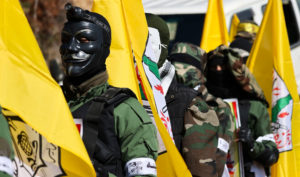In the Middle East, transitions between US presidential administrations are often times of bold attempts at diplomacy. It was in the last days and hours of the Clinton administration that intense final status talks were advanced for an Israeli-Palestinian peace, only to be rejected by the Palestinians. It was in the last weeks of the Reagan administration that the US changed its longstanding policy of shunning the Palestine Liberation Organization. And it was the final weeks of the Obama administration that a UN Security Council resolution locking in a set of mostly pro-Palestinian positions on the conflict was engineered by the Americans, who subsequently abstained on the resolution everyone knew they were behind.
For Israel and Lebanon, the coming weeks will be no different. The outgoing Biden team will seek to have an impact on the war. The incoming Trump team will manoeuvre to have as much unpleasantness as possible finished before it comes and as much credit as possible coming to them. And various European and Arab states will seek to exploit the American transition for their own initiatives.
Across the West, diplomats and experts have settled on a consensus for solving the ongoing Arab-Israeli war — one that reveals exactly why international diplomatic efforts have consistently failed. At its core, this approach focuses on restoring the very ceasefire conditions which Lebanon and Hezbollah violated last year, while avoiding any mention of even the desirability of peace — something Lebanon would benefit from more than any other party. In failing to recognise this, our international diplomats embody all the pathologies and failures that have come to define their contribution to this decades-long conflict.
According to the Quai d’Orsay and the State Department, the formula for ending the war merely requires punching in the four-digit PIN code 1701. That, of course, is UN Security Council resolution 1701, the one that ended the last war back in 2006. The resolution included several clear obligations for all parties. Israel was to withdraw from Lebanese territory. Hezbollah was to move all its forces north of the Litani River, creating a buffer zone where the only permitted armed forces would be those of the UN peacekeeping force (UNIFIL) and the Lebanese Army (LFA). UNIFIL was to monitor and enforce these deployments. And Hezbollah was supposed to be decommissioned as an armed force inside sovereign Lebanese territory.
The first measure, Israeli withdrawal, was implemented within days of the resolution’s passage. The others were not. Once Israel’s withdrawal was complete, UNIFIL announced that it had no intention of enforcing 1701, and over the course of the next 17 years, Hezbollah assembled an arsenal of rockets and missiles. It also built a network of tunnels that were supposed to allow it, in a future war, to “conquer the Galilee” in an operation similar to the one Hamas ultimately launched hundreds of kilometres away in southern Israel.
The day after Hamas’s assault on southern Israel on October 7 last year, Hezbollah began firing rockets on northern Israel, forcing the rapid evacuation of border communities comprising nearly 100,000 residents, most of whom have yet to return home. After 11 months of low-intensity warfare, Israel took the initiative, and in 11 days managed to deal Hezbollah a decisive blow.
On 17 and 18 September, exploding pagers and walkie-talkies disabled the militia’s communications network, taking thousands of fighters out of commission. Over the next week, a series of airstrikes based on precise intelligence destroyed the majority of Hezbollah’s rockets and launchers and eliminated key military commanders. Finally, on 27 September, an Israeli airstrike on a bunker in Beirut killed nearly every senior figure in the organisation, including its voluble leader Hassan Nasrallah. This was followed by a ground invasion which has seen tunnels and munitions, prepared over a decade and more, destroyed with huge losses to Hezbollah and minimal losses to the IDF.
However, the 11-day campaign woke up the international community in a way that 11 months of rocket fire did not. And the unanimous response has been an urgent call for implementation of 1701. David Lammy called for a “political solution in line with Resolution 1701”. The French ambassador to the UN called upon Israel “to stop the escalation underway in Lebanon” and reiterated Frances determination for a cessation of hostilities “in accordance with Resolution 1701”. Hours before the successful operation to kill Nasrallah, the US, Canada, Australia, Canada and a host of European and Arab states issued a joint declaration demanding an immediate 21-day cease “to provide space for diplomacy towards the conclusion of a diplomatic settlement consistent with UNSCR 1701”.
This consensus around the indeterminate and obsolete Security Council resolution tells, in short, the entire story of the failure to resolve this conflict. If there is one thread running through nearly every diplomatic effort of the last eight decades, it is a firm commitment to the idea that any party that launches a war against Israel and is then defeated is entitled to a restoration of the conditions it violently rejected when launching the war.
This unspoken normative commitment explains the iterations of final status plans presented to the Palestinian leadership after its rejection of statehood at Camp David and subsequent suicide bombing campaign of the early 2000s. It explains the insistence on pre-1967 armistice lines as the only legal basis for Israel’s border after 1967. It explains the curious exception to that norm regarding the refusal to recognise even the pre-1967 part of Jerusalem as Israel’s capital. And it explains the cruel human experiment known as UNRWA, a refugee agency that, unlike any other refugee agency, exists not to rehabilitate refugees but rather to keep them in a permanent state of immiseration to maintain an irredentist claim against another country.
Such a norm has not featured in the post-war mediation of any other conflict, not before 1945 and not since. No one has ever seriously suggested creating a kind of sportsman’s mulligan as an international diplomatic norm for other conflicts for this very reason. It’s not hard to see why this might be the case. If the international community extended a line of insurance to other aggressors, which promised that launching wars could bring gains with victory but no losses with defeat, there would be a lot more wars.
But what’s even more notable than the warped consensus around 1701 is the absence of any mention of making peace between the two neighbouring states. Nowhere is the establishment of normal diplomatic relations between Lebanon and Israel even mentioned as a long-term goal.
One might argue that peace right now is not realistic, and that may be true. But that is equally true about an Israeli withdrawal from the West Bank or the establishment of a Palestinian state or the redivision of Jerusalem — and yet these are always mentioned as long-term goals by European governments.
Why shouldn’t a peace treaty be the clearly stated goal? Normal diplomatic relations would resolve any existing border disputes. After all, the ones still extant are tiny and largely invented pretexts for maintaining Hezbollah’s arsenal.
Just before the US election, France hosted an “International Conference in Support of Lebanon’s People and Sovereignty”, where $1 billion in aid was pledged and where French President Macron claimed Israel was “sowing barbarism”. If there was any suggestion that Lebanon’s situation might have been improved by not firing rockets into Israel for the past 11 months, the participants were too polite to mention it. Nor was there any reckoning with Lebanon’s decision to cultivate an alternative armed force, larger than its own military, implicated in atrocities in Syria, and answerable to the Islamic Republic of Iran. The insistence of global actors, most notably the host country itself, on protecting Hezbollah and securing for it advantageous ceasefire arrangements in previous wars in 1996 and 2006 also went unmentioned.
And no one mentioned peace. Normal diplomatic relations between Lebanon and Israel wouldn’t mean that Lebanon agrees with everything Israel does. This is already the case for France as well as most of its allies. For that matter, it is also the case for Egypt and Jordan. It would just mean that there is an agreed border, a possibility for minimal economic cooperation, and a commitment to resolve disputes by negotiation. Good for Israel, to be sure. But even better for Lebanon.
True, no one could seriously believe that this path will be adopted. But the reticence to even raise the topic of peace is in many ways revealing. Most obviously, it sends the wrong message and incentivises the wrong behaviours — as well as violates any normal diplomatic practice regarding other international disputes. But it also mirrors the manner in which the contemporary Western cordon sanitaire around racism has an elaborate permission structure exempting hatred of Jews. Once again, all that’s required is to frame one’s dislike as a kind of grievance against Israel — rather than as pathological hatred of a highly imperfect state that is fighting a complex seven-front war it did not seek.
Disclaimer
Some of the posts we share are controversial and we do not necessarily agree with them in the whole extend. Sometimes we agree with the content or part of it but we do not agree with the narration or language. Nevertheless we find them somehow interesting, valuable and/or informative or we share them, because we strongly believe in freedom of speech, free press and journalism. We strongly encourage you to have a critical approach to all the content, do your own research and analysis to build your own opinion.
We would be glad to have your feedback.
Source: UnHerd Read the original article here: https://unherd.com/



